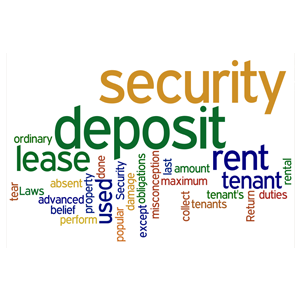Whether you’re getting ready to rent your first unit or you’ve been renting for a little while already, security deposits are probably on your checklist. You know they’re a way to guarantee coverage in the case of damaged or missing property, or an unforeseen issue that breaks the lease agreement.
- -But what don’t you know?
- -Are you just collecting an arbitrary amount, or have you put thought into what you’re charging and why?
- -What do you do if someone can’t pay the full amount up front?
- -Are you familiar with your state and local laws and regulations?
These are all questions you should ask yourself before renting out your unit. If you’ve already taken the leap, revisit these questions for your next rental agreement. Not sure where to start? We can help.
Where to Start with Security Deposits

First things first: always, always, always familiarize yourself with your local laws for renting and leasing. Often, these laws stipulate what you can charge for a security deposit. You may be required to itemize the amounts you are withholding from your tenant, should they move out. This is to protect the renter and ensure landlords aren’t abusing their position by holding back the deposit for unjustified reasons. You cannot just keep a full security deposit, even if a tenant breaks their agreement. Most landlords must specify how a deposit was used in the case of repairs and refurbishing, or must reimburse the ex-tenant a pro-rated amount if they fill the unit within a certain timeframe. Consult your legal council to ensure you’re following the letter of the law.
What about the expense of the deposit?
Many landlords choose to have new tenants pay the first month’s rent and a deposit up front. This can be a prohibitive cost for prospective tenants who have solid credit and income, but not enough funds to cover a significant deposit up front. Ultimately, the call is yours, but it’s worth considering whether you’re comfortable with a tenant paying a deposit over time, rather than all at once. A monthly fee can be negotiated and added to the rental fee for the first few months. This helps open up your tenant pool a little more and prevents losing out on a good tenant because they’re a little short.
You should never consider a deposit “your money” until it is, in fact, your money. This means it’s wise to keep your deposit funds in a trust or separate account that you don’t touch unless they become usable at the end of a tenant’s lease, or if the lease is broken. A deposit is just that — a deposit of the tenant’s funds to ensure their spot and cover potential issues at the end of their lease. Do not spend deposit funds early, and keep good financial records. Inability to pay back an owed deposit is an excellent way to end up in court.
How We Can Help
As always, we recommend our RentalConnect program as an added tool for selection the right tenants for your property. RentalConnect offers property owners and landlords a great alternative to the expense of full tenant screening. This service requires no on-site visit, sign-up, or membership fees, making it extra convenient. The service fee is paid by the applicant. Available 24/7, RentalConnect is fast, easy, secure, and delivers reports needed to make an informed decision, including a credit report, a national criminal search, and a national eviction search. Reach out to us for more details!
Landlords Property Managers Contact TSCI